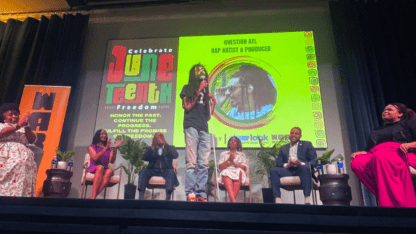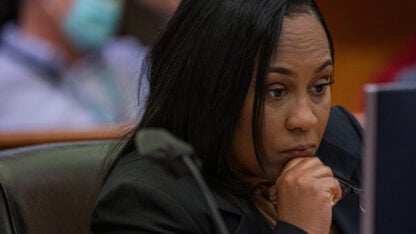From dancing to life coaching to entrepreneurial ventures, TikTok has quickly become a digital hub for millions of Georgians and users nationwide.
It has also become a haven for influencers to give themselves and their brands higher visibility. The platform entertains its users but has also grown to offer seemingly endless resources related to political, social and educational content.
But TikTok has also become a subject of controversy, both among government officials and content critics.
The U.S. claims the app’s collecting of users’ private data is a national security threat. Others, particularly conservative officials and parents, have issues with content accessible to younger users, particularly regarding race, LGBTQ people and sexual content.
Despite a push for government officials to ban the platform, Georgia Tiktokers are still hard at work in developing content that makes a digital wave, as well as a difference.
“There are millions of people out there just like me that, you know, can relate to exactly what I’m posting, and that I think is the best feeling in the world.”
Nick Tigges, comedian
Laugh and learn
They say that laughter can be the best medicine, and for many social media users diagnosed with autism, comedian Nick Tigges has proven himself to be a well-sought-after prescription.
After being diagnosed with the neurological and developmental disorder at the age of 30, Tigges quickly found stand-up as the perfect outlet for discussing his humorous experiences living with the disorder.
He began posting some of his performances on TikTok, and he slowly amassed 10,000 followers. His videos have been liked and seen by millions across the app worldwide.
“It feels great,” said Tigges on the rising viewership of his content. “I hope with telling these jokes and promoting this content, [it] can be reassuring to those in my situation … basically [allowing them to find] the silver lining in situations that are not great.”
He attributes his success to the fact that his jokes not only reflect on his experiences living with autism, but also educate the audience on the misconceptions and stereotypes related to the disorder.
“In the past, and still even now, I feel like a lot of the jokes about autism are more punching down, and lot of them treat them more as a quirk. And I used to do that,” he said.
Behavioral therapy, which he says is one of the best decisions he has ever made, has allowed him to be more outgoing and has contributed to his transition into being an active figure on social media.
Despite the benefits of being able to laugh at himself, he said that living with the disorder — especially when undiagnosed as a child — caused a lot of anxiety and stress in both professional and social activities.
“For dating, it’s very easy for me to miss intimacy cues,” he said. “And also not realizing the dangers in maybe doing something like, for example, someone inviting me back to their place to do taxidermy. “
And while appreciative of the views and likes he has collected, he says the comments left by other users diagnosed with autism have served as the most generous silver lining.
“A lot of people who have had similar experiences to me have commented, ‘Hey I feel this’ or ‘This is exactly how I am too … I have the exact same quirk,'” he said.
“It’s been a lot of positive feedback and it’s very reassuring to me to realize that … even though I feel like I’m alone in the world when it comes to the issues I face with autism, I’m not alone. There are millions of people out there just like me that, you know, can relate to exactly what I’m posting, and that I think is the best feeling in the world,” he added.
The rising comic says he is just as grateful for those who leave negative responses tohis videos as well.
“I mean at this point if someone doesn’t like my stuff, if you comment, you’re still helping the algorithm. So I still win.”
Shop and share
In the heart of Southwest Atlanta on an early June afternoon, volunteers and employees are hard at work at The Grocery Spot, a nonprofit organization that provides free groceries to community members who need assistance with food resources.
Giovanni Yaquinto, an Atlanta musician and co-founder of the organization, assists in making final preparations before the shop opens at 3 p.m., with lines already forming across the street.
Yaquinto helped to establish The Grocery Spot in 2020 after being informed by co-owner and concept developer Matt Jones of the growing food deserts throughout metro Atlanta.
The store originally began as for-profit, but they quickly saw that it wasn’t beneficial to the residents they were working to serve.
“As our store grew, our mission grew, and we came to understand that we actually needed to find a way to provide the groceries for free, because that is what our city needed,” he noted.
Shaniqua Fitzpatrick, who does social media for the nonprofit, had her first experience with The Grocery Spot as a recipient in October 2022.
Seeing the much-needed work that Yaquinto and his team were doing for the community, she began using her social media platforms to bring attention to The Grocery Spot for followers who could benefit from their services.
“Me knowing that I needed assistance … I just started letting others know [about The Grocery Spot], and that turned into something bigger than I expected.”
“We have no government assistance, so the majority of the money we make to buy groceries … It’s not millionaires supporting us, it’s $5, $10 donations from people in our community.”
Giovanni Yaquinto, co-founder – The Grocery Spot
She was soon invited to join The Grocery Spot team, which she says has allowed her creative and innovative opportunities to get the word out about the organization’s mission.
“Just today, on a typical Monday, we’re are going to serve over 700 people from the community, and that’s only in a three-hour window that we’re actually open,” said Yaquinto.
“One of the biggest things online that’s made us successful is that so many people in the community will share our content,” she said. “We’re out here giving food and doing our best to empower our community, and we find that they are reciprocating by empowering us online.”
The organization has grown not only its digital following, but also its physical space.
In January, they moved to a larger location that better serves the amount of residents in the community who have begun patronizing the store. The previous location, still in the same community, has been transformed into a thrift store run by the organization.
The social media platform has also allowed the organization to raise funds to keep its community service running.
In May, the organization experienced an electricity bill of over $2,000. They reached out to followers to help pay it off.
“We had I think over 100 people share the post,” he said. “We have no government assistance, so the majority of the money we make to buy groceries and keep the store open are small donations by normal people. It’s not millionaires supporting us, it’s $5, $10 donations from people in our community.”









